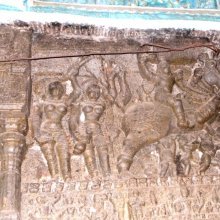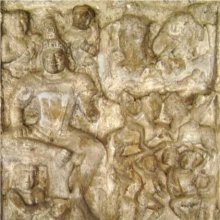Sword: 2 definitions
Introduction:
Sword means something in Hinduism, Sanskrit, Jainism, Prakrit. If you want to know the exact meaning, history, etymology or English translation of this term then check out the descriptions on this page. Add your comment or reference to a book if you want to contribute to this summary article.
Images (photo gallery)
(+126 more images available)
In Hinduism
Yoga (school of philosophy)
Source: ORA: Amanaska (king of all yogas): A Critical Edition and Annotated Translation by Jason BirchThe (Magical) Sword refers to one of the boons (granted by Aghorī), forming part of the powers granted to one following certain Yoga practices, according to the Brahmayāmala-tantra (or Picumata), an early 7th century Śaiva text consisting of twelve-thousand verses.—Accordingly, [while describing a haṭha-sādhana (foreceful practice)]: “[When the Sādhaka] remains [in the hole] for up to one day, he is freed from all sins. [...] On the eighth day, the Sādhaka sees the shadow of Aghorī. Thus content, she gives [a boon, saying to the Sādhaka], ‘Good, my dear! Choose a boon: either lord of the earth, immortality, levitation, [entry into the] netherworlds, coming and going through the sky, invisibility, the elixir of mercury, the wish-fulfilling gem, the [magical] sword (khaḍga), the [seven-league] sandals or the [occult] eye collyrium [...]’ [...]”

Yoga is originally considered a branch of Hindu philosophy (astika), but both ancient and modern Yoga combine the physical, mental and spiritual. Yoga teaches various physical techniques also known as āsanas (postures), used for various purposes (eg., meditation, contemplation, relaxation).
In Jainism
General definition (in Jainism)
Source: Singhi Jain Series: Ratnaprabha-suri’s Kuvalayamala-kathaSword refers to one of the various attributes held by the Eight auspicious Girls (representing the eight celestial nymphs of Indra’s heaven) (also: aṣṭakanyā), according according to “A Cultural note on the Kuvalayamala of Uddyotanasuri” by the late Dr. V. s. Agrawala.—It is stated in the Vālmīki Rāmāyaṇa (Sundara-kāṇḍa 18.11-4) that these eight auspicious girls moved in the train of Rāvaṇa holding respectively: i) a golden lamp; ii) fly-whisk; iii) fan-palm; iv) golden water-pot; v) sword; vi) rolled-up seat; vii) platter of gems; viii) parasol with golden star. These were depicted on the railing pillars at Mathura during the Kushan period some of which were obtained from the Jaina Kankali Tila and others from Buddhist Stūpa, they being accepted in both religions as auspicious.

Jainism is an Indian religion of Dharma whose doctrine revolves around harmlessness (ahimsa) towards every living being. The two major branches (Digambara and Svetambara) of Jainism stimulate self-control (or, shramana, ‘self-reliance’) and spiritual development through a path of peace for the soul to progess to the ultimate goal.
See also (Relevant definitions)
Starts with: Sword aloe, Sword bean, Sword brake, Sword fern, Sword grass, Sword leaf, Sword lily, Sword-leaf flax-lily, Swordgrass, Swordleaf rush, Swordlike atractylodes, Swordsmanship.
Ends with: Magical sword.
Full-text (+2051): Khadga, Asi, Asidhara, Rishti, Asipatra, Tsaru, Nandaka, Kauksheyaka, Asilata, Mandalagra, Ili, Kripana, Asipatravana, Bhidaka, Asihatya, Karapala, Pareraka, Kaditula, Shastra, Paranja.
Relevant text
Search found 290 books and stories containing Sword; (plurals include: Swords). You can also click to the full overview containing English textual excerpts. Below are direct links for the most relevant articles:
Nitiprakasika (Critical Analysis) (by S. Anusha)
Heimskringla (by Snorri Sturlson)
Part 90 - Halfred Vandredaskald Baptized < [Chapter VI - King Olaf Trygvason's Saga]
Part 172 - Of King Olaf's Presents At Yule < [Chapter VII - Saga Of Olaf Haraldson]
Part 43 - Hakon, The Foster-son Of Athelstan, Is Baptized < [Chapter III - Harald Harfager's Saga]
The Agni Purana (by N. Gangadharan)
Chapter 245 - The characteristics of the royal fan (cāmara-lakṣaṇa)
Chapter 252 - The mode of wielding the swords, maces etc.
Harshacharita (socio-cultural Study) (by Mrs. Nandita Sarmah)
Part 9.4: Weapons of the War < [Chapter 5 - Political Aspects]
Part 3: Description of Different Tribes and Sub-Castes < [Chapter 2 - Caste System]
1. Similarities (5): Economic Condition < [Chapter 8 - Comparative Society as described in the Kādambarī and the Harṣacarita]
Vakyapadiya of Bhartrihari (by K. A. Subramania Iyer)
Verse 3.7.31 < [Book 3 - Pada-kāṇḍa (7): Sādhana-samuddeśa (On the Means)]
Verse 3.7.96 < [Book 3 - Pada-kāṇḍa (7): Sādhana-samuddeśa (On the Means)]
Verse 3.7.29 < [Book 3 - Pada-kāṇḍa (7): Sādhana-samuddeśa (On the Means)]
Yoga Vasistha [English], Volume 1-4 (by Vihari-Lala Mitra)
Chapter L - Death of viduratha < [Book III - Utpatti khanda (utpatti khanda)]
Chapter XXXIII - Comingled fighting < [Book III - Utpatti khanda (utpatti khanda)]
Chapter XII - Greatness of true knowledge < [Book II - Mumukshu khanda (mumukshu-vyavahara khanda)]





